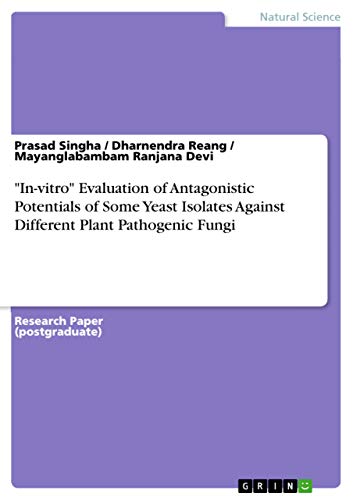Artículos relacionados a "In-vitro" Evaluation of Antagonistic Potentials...
"In-vitro" Evaluation of Antagonistic Potentials of Some Yeast Isolates Against Different Plant Pathogenic Fungi - Tapa blanda

"Sobre este título" puede pertenecer a otra edición de este libro.
- EditorialGRIN Verlag
- Año de publicación2017
- ISBN 10 3668574596
- ISBN 13 9783668574595
- EncuadernaciónTapa blanda
- Número de edición1
- Número de páginas20
Comprar nuevo
Ver este artículo
Gastos de envío:
EUR 23,00
De Alemania a Estados Unidos de America
Los mejores resultados en AbeBooks
"In-vitro" Evaluation of Antagonistic Potentials of Some Yeast Isolates Against Different Plant Pathogenic Fungi
Descripción Taschenbuch. Condición: Neu. This item is printed on demand - it takes 3-4 days longer - Neuware -Research Paper (postgraduate) from the year 2010 in the subject Biology - Botany, , language: English, abstract: Research on the control of plant diseases by phyllosphere applied biological control agents has produced a wealth of informations on a wide range of fungal and bacterial biocontrol agents and their applications for controlling diseases affecting leaves, flowers and fruits. Research into their mode of action and ecological adaptation has provided critical insights that have increased commercial utilization of phyllosphere applied biocontrol agents has proven to be challangeing because the leaf surface presents a relatively hostile environment for introduced microbes with a relative paucity of available nutrients, wide water availability fluxes, direct exoposure to ultraviolet radiation and infrared radiation and competition with other phyllosphere colonist. Foliar applied biocontrol agents do not have the avoidance strategy of endophytic growth available to pathogens and therefore must primarily utilize a tolerance strategy whereby they colonise and survive on the leaf surface or in protected sites that may or may not be the same as the pathogen they are intended to control. Because of the variable effects of the biological and physical environment, the vast majority of phyllosphere applied biocontrol agents research has been focused on glasshouse or storage environment wherethe physical environment is more predictable and stable. Many of the early studies aimed at the study of the mode of action and evaluation of the efficacy of some potential biocontrol bacteria, such as Brevibaccilus subtilis, producer of antibiotics, however, the application of such bacteria on fruit did not prove to be commercially acceptable. Wilson and Wisniewski indicated the following characteristics of an ideal antagonist: genetic stability, efficacy at low concentrations and against a wide range of pathogens on various fruit products, simple nutritional requirements, survival in adverse environmental conditions, growth on cheap substrates in fermenters, lack of pathogenicity for the host plant and no production of metabolites potentially toxic to humans, resistance to the most frequently used pesticides and compatibility with other chemical and physical treatments. Yeasts seem to possess a good number of the above mentioned features and during the last few years, research has been made on the selection and study of yeasts. 20 pp. Englisch. Nº de ref. del artículo: 9783668574595
"In-vitro" Evaluation of Antagonistic Potentials of Some Yeast Isolates Against Different Plant Pathogenic Fungi
Descripción Taschenbuch. Condición: Neu. Druck auf Anfrage Neuware - Printed after ordering - Research Paper (postgraduate) from the year 2010 in the subject Biology - Botany, , language: English, abstract: Research on the control of plant diseases by phyllosphere applied biological control agents has produced a wealth of informations on a wide range of fungal and bacterial biocontrol agents and their applications for controlling diseases affecting leaves, flowers and fruits. Research into their mode of action and ecological adaptation has provided critical insights that have increased commercial utilization of phyllosphere applied biocontrol agents has proven to be challangeing because the leaf surface presents a relatively hostile environment for introduced microbes with a relative paucity of available nutrients, wide water availability fluxes, direct exoposure to ultraviolet radiation and infrared radiation and competition with other phyllosphere colonist. Foliar applied biocontrol agents do not have the avoidance strategy of endophytic growth available to pathogens and therefore must primarily utilize a tolerance strategy whereby they colonise and survive on the leaf surface or in protected sites that may or may not be the same as the pathogen they are intended to control. Because of the variable effects of the biological and physical environment, the vast majority of phyllosphere applied biocontrol agents research has been focused on glasshouse or storage environment wherethe physical environment is more predictable and stable. Many of the early studies aimed at the study of the mode of action and evaluation of the efficacy of some potential biocontrol bacteria, such as Brevibaccilus subtilis, producer of antibiotics, however, the application of such bacteria on fruit did not prove to be commercially acceptable. Wilson and Wisniewski indicated the following characteristics of an ideal antagonist: genetic stability, efficacy at low concentrations and against a wide range of pathogens on various fruit products, simple nutritional requirements, survival in adverse environmental conditions, growth on cheap substrates in fermenters, lack of pathogenicity for the host plant and no production of metabolites potentially toxic to humans, resistance to the most frequently used pesticides and compatibility with other chemical and physical treatments. Yeasts seem to possess a good number of the above mentioned features and during the last few years, research has been made on the selection and study of yeasts. Nº de ref. del artículo: 9783668574595

